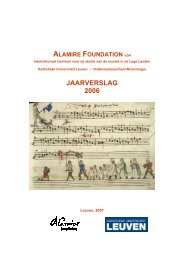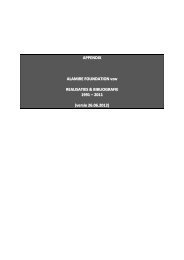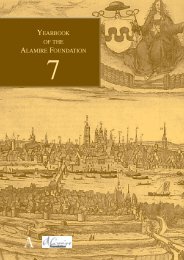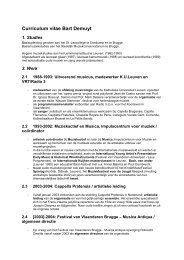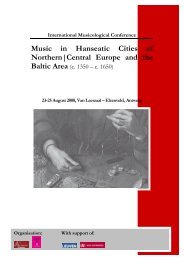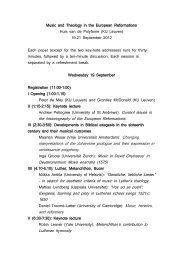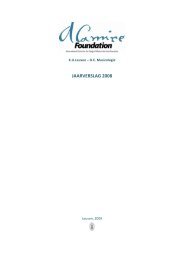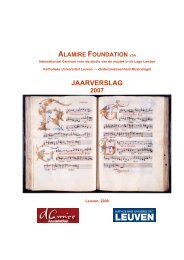YEARBOOK OF THE ALAMIRE FOUNDATION
YEARBOOK OF THE ALAMIRE FOUNDATION
YEARBOOK OF THE ALAMIRE FOUNDATION
Create successful ePaper yourself
Turn your PDF publications into a flip-book with our unique Google optimized e-Paper software.
136 DONNA G. CARDAMONE JACKSON<br />
Among other Neapolitans whose works could have circulated in Rome, is Gian<br />
Domenico da Nola, a poet-composer and one of the founders of the Accademia dei<br />
Sereni in Naples along with Luigi Dentice (‘custode de li scripti’). 25 No. 17 in Dorico’s<br />
anthology is a paraphrased version of an ottava from Velardiniello’s farce, which<br />
might be attributed to Nola on the basis of his attraction to the bard’s verse. Frequent<br />
textual allusions to the Farza de li massari turn up in Nola’s two books of canzoni<br />
villanesche (Venice, 1541); moreover, the second book contains an ottava, Una lampuca<br />
ò visto co ’na groya, drawn literally from the farce. 26 No. 17 was converted into<br />
a villanella by the addition of a refrain after each couplet, a process that involved<br />
repositioning and paraphrasing some of the original lines:<br />
Ottava<br />
Ogni massaro è ricco, et io meschino,<br />
Tutto lo giorno mi crepo a zappare;<br />
N’haggio ventura a cannavo né a lino,<br />
Non saccio como voglio più campare;<br />
Puto la vigna per aspettar lo vino,<br />
Li sturni son li primi a vendegnare;<br />
Da chi perdivi a ponticello renza,<br />
Sempre haggio fatta trista recoglienza. 27<br />
Villanella<br />
(1) Ogni villano è ric’et io meschino,<br />
Sempre ogni giorno allo camp’ad arrare.<br />
Non saccio come posso più campare.<br />
(2) Mai ce va ’nanzi canavo nè lino,<br />
Perdo lo tiempo e crepom’azzapare.<br />
Non saccio come posso più campare.<br />
(3) Puto le vite et aspetar lo vino,<br />
Li storni sono i primi a vendegnare.<br />
Non saccio come posso più campare.<br />
(4) Da che pigliai a pontecello rènza,<br />
Sempre haggio fatto e fossene de senza.<br />
Trista vendegna e peggio racoglienza.<br />
Every farmer is rich but poor me,<br />
always at the field every day to plow.<br />
I don’t know how I can get by anymore.<br />
One never gets ahead of hemp or flax,<br />
I get behind and collapse digging with the hoe,<br />
I don’t know how I can get by anymore.<br />
I prune the grapevines looking forward<br />
to the wine the starlings are the first to harvest.<br />
I don’t know how I can get by anymore.<br />
Since I went down the usual bridge<br />
as I have always done and could have done<br />
without, dismal grape harvest and worse<br />
reaping.<br />
25 T. TOSCANO, Un’orazione latina inedita di Berardino Rota ‘principe’ dell’Accademia dei Sereni di<br />
Napoli, in Letterati corti accademie. La letteratura a Napoli nella prima metà del Cinquecento, Naples,<br />
2000, pp. 315, 322.<br />
26 L. CAMMAROTAed., Gian Domenico del Giovane da Nola. I Documenti biografici e l’attività presso<br />
la SS. Annunziata con l’opera completa, Rome, 1973, no. 30.<br />
27 Quoted from a later version of Velardiniello’s farce by L. EMERY, Il ‘Lamento’e la ‘Farza de li massare’<br />
di Velardiniello, in Archivio storico per le province napoletane, N.S., 22 (1937), p. 327.



